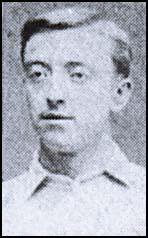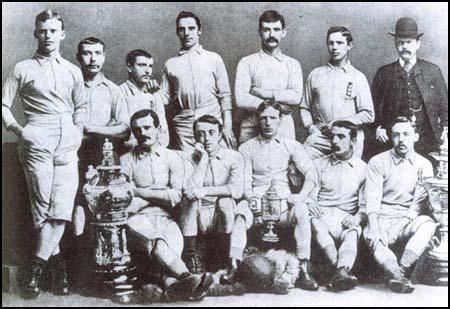Joe Sowerbutts

Joe Sowerbutts was born in Blackburn. A talented footballer he joined Blackburn Rovers and by 1883 he began appearing in the first team. He played at inside-left in the 1884 FA Cup Final. Their opponents were Queens Park, the best team in Scotland. Forrest played at right-half. The Scottish club scored the first goal but Blackburn Rovers won the game with goals from Sowerbutts and James Forrest.
In January, 1884, Preston North End played the London side, Upton Park, in the FA Cup. After the game Upton Park complained to the Football Association that Preston was a professional, rather than an amateur team. Major William Sudell, the secretary/manager of Preston North End, admitted that his players were being paid but argued that this was common practice and did not breach regulations. However, the Football Association disagreed and expelled them from the competition.
Blackburn Rovers, who denied they were paying their players, beat Old Carthusians 5-0 in the semi-final of the FA Cup. Once again they had to play Queens Park in the final. Blackburn Rovers was now a team full of internationals. This included James Forrest, Jimmy Brown, Herbie Arthur, Joseph Lofthouse, Hugh McIntyre and Jimmy Douglas. A crowd in excess of 12,000 arrived at the Oval to see the what most people believed were the best two clubs in England and Scotland. This time Sowerbutts played at outside right. With goals from Brown and Forrest, Blackburn Rovers won 2-0.

Cup that they won in 1883-84 season. Back row, left to right: Joseph Lofthouse,
Hugh McIntyre, Joe Beverley, Herbie Arthur, Fergie Suter, James Forrest,
Richard Birtwistle, Front row: Jimmy Douglas, Joe Sowerbutts, Jimmy Brown,
George Avery and John Hargreaves.
At the end of the 1883-84 season Preston North End joined forces with other clubs who were paying their players, such as Aston Villa and Sunderland. In October, 1884, these clubs threatened to form a break-away British Football Association. The Football Association responded by establishing a sub-committee, which included William Sudell, to look into this issue. On 20th July, 1885, the FA announced that it was "in the interests of Association Football, to legalise the employment of professional football players, but only under certain restrictions". Clubs were allowed to pay players provided that they had either been born or had lived for two years within a six-mile radius of the ground.
Blackburn Rovers immediately registered as a professional club. Their accounts show that they spent a total of £615 on the payment of wages during the 1885-86 season. Despite the fact that clubs could now openly pay their players, Blackburn Rovers continued to dominate English football. They reached the 1885 FA Cup Final by beating Darwen Old Wanders (6-1), Staveley (7-1), Brentwood (3-1) and Swifts (2-1) Seven of the Blackburn Rovers team, including Joe Sowerbutts, were appearing in their third successive final, whereas Jimmy Brown, Fergie Suter, Hugh McIntyre and Jimmy Douglas were playing in their fourth final in five season. This time Sowerbutts played at centre-forward. The game against West Bromwich Albion at the Oval ended in a 0-0 draw.
The replay took place at the Racecourse Ground, Derby. A goal by Joe Sowerbutts gave Blackburn Rovers an early lead. In the second-half Jimmy Brown collected the ball in his own area, took the ball past several WBA players, ran the length of the field and scored one of the best goals scored in a FA Cup Final. Blackburn Rovers now joined the Wanderers in achieving three successive cup final victories.
The decision by the Football Association to allow clubs to pay their players increased their out-goings. It was therefore necessary to arrange more matches that could be played in front of large crowds. In March, 1888, William McGregor, a director of Aston Villa, circulated a letter suggesting that "ten or twelve of the most prominent clubs in England combine to arrange home and away fixtures each season." The following month the Football League was formed. It consisted of six clubs from Lancashire (Blackburn Rovers, Preston North End, Accrington, Burnley and Everton) and six from the Midlands (Aston Villa, Derby County, Notts County, Stoke, West Bromwich Albion and Wolverhampton Wanderers). The main reason Sunderland was excluded was because the other clubs in the league objected to the costs of travelling to the North-East.
The first season of the Football League began in September, 1888. Preston North End won the first championship that year without losing a single match and acquired the name the "Invincibles". Blackburn Rovers, who had lost most of their best players to retirement, finished in 4th place, 14 points behind Preston.
At the beginning of the 1889-90 season Tom Mitchell, the club secretary, recruited four top players from Scotland: Tom Brandon, Johnny Forbes, George Dewar and Harry Campbell. A local lad, Nathan Walton was also drafted into the side. Other key players that season included Joseph Lofthouse and Jack Southworth. Joe Sowerbutts found it impossible to get a game and left the club.
